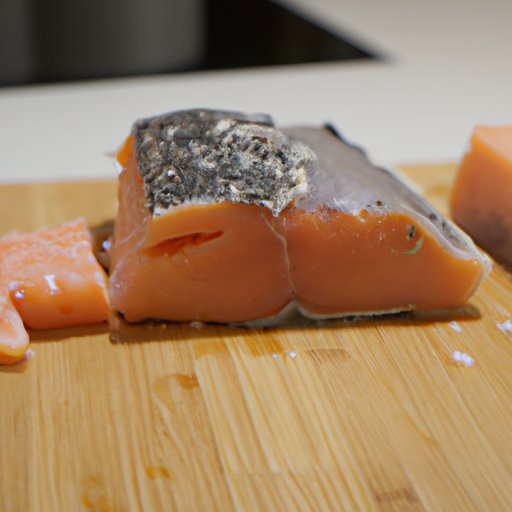Introduction
Atlantic salmon is a type of fish found in the cold waters of the North Atlantic Ocean. It is an excellent source of lean protein and other essential nutrients, making it a popular choice among those looking to incorporate more seafood into their diets. In this article, we’ll explore the health benefits of eating Atlantic salmon and learn how to incorporate it into a healthy diet.
Is Eating Atlantic Salmon Good for You?
Atlantic salmon is a nutritious option that offers many potential health benefits. According to a study published in the British Journal of Nutrition, eating Atlantic salmon can help reduce inflammation, improve heart health, and support brain function. Additionally, the omega-3 fatty acids found in Atlantic salmon are beneficial for joint health, eye health, and cognitive development.
The benefits of eating Atlantic salmon should be weighed against its potential downsides. Farmed Atlantic salmon may contain higher levels of pollutants due to the contaminated feed they are given. Additionally, some farmed salmon may contain antibiotics or other chemicals used in fish farming.

Exploring the Health Benefits of Atlantic Salmon
Atlantic salmon contains a variety of essential nutrients, including vitamins A, B12, and D, as well as minerals like selenium, phosphorus, and magnesium. It is also rich in omega-3 fatty acids, which have anti-inflammatory properties and can reduce the risk of cardiovascular disease. Additionally, Atlantic salmon is a good source of high-quality protein and contains important amino acids that are necessary for muscle growth and repair.
In comparison to other types of fish, Atlantic salmon has a high level of omega-3 fatty acids, making it an especially beneficial choice for those looking to increase their intake of this nutrient. As registered dietitian nutritionist Vanessa Rissetto told Health, “Salmon is one of the few foods that provide a significant amount of omega-3s, so it’s a great choice for people who don’t eat fish regularly.”
Incorporating Atlantic Salmon into a Healthy Diet
If you’re looking to add more Atlantic salmon to your diet, there are several ways to do so. Try adding it to salads, soups, and pasta dishes, or serve it as a main course alongside vegetables. You can also use canned or frozen Atlantic salmon for easy meal prep and snacks. When shopping for Atlantic salmon, opt for wild-caught varieties whenever possible to minimize your exposure to pollutants.
When cooking with Atlantic salmon, keep in mind that it cooks quickly. Rissetto recommends cooking the fish in a skillet over medium heat with a bit of oil, flipping it once, and cooking until it’s opaque throughout. Additionally, she suggests avoiding overcooking, as this can make the fish dry and tough.
Conclusion
Atlantic salmon is a nutritious fish with many potential health benefits. It is rich in omega-3 fatty acids, vitamins, minerals, and high-quality protein, making it an excellent addition to any diet. When selecting Atlantic salmon, opt for wild-caught varieties when possible and cook it quickly to avoid drying out the fish. By following these tips, you can easily add Atlantic salmon to your meals and reap the nutritional rewards of this delicious fish.
(Note: Is this article not meeting your expectations? Do you have knowledge or insights to share? Unlock new opportunities and expand your reach by joining our authors team. Click Registration to join us and share your expertise with our readers.)
